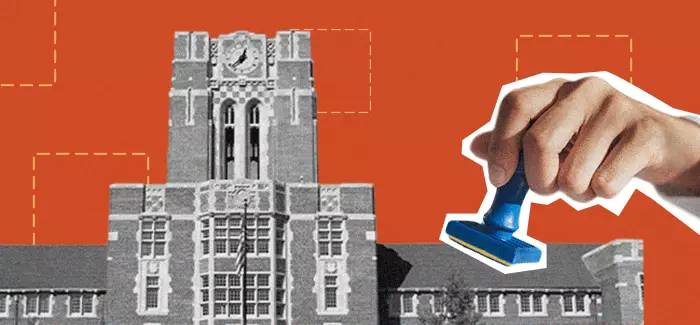A deep dive into University of Phoenix’s accreditation

Written by Elizabeth Exline

This article was reviewed by McCeil Johnson, JD, Vice President, Accreditation and Regulatory Compliance.

How, as a prospective college student, do you ensure that your investment of time and money into higher education will be worth it? Part of the equation depends on your degree program and aptitude. Part of it also depends on accreditation.

McCeil Johnson, JD
Vice President, Accreditation and Regulatory Compliance at University of Phoenix
“Accreditation is an independent evaluation of educational quality and rigor,” explains McCeil Johnson, JD, the vice president of accreditation and regulatory compliance at University of Phoenix.
The reason accreditation holds so much authority hinges on what goes into the process. Available on both institutional and programmatic levels, accreditation involves high standards and evaluation criteria, a lot of transparency and ongoing reviews.
University of Phoenix has maintained institutional accreditation by the Higher Learning Commission (HLC), hlcommission.org, since 1978. Not surprisingly, the University believes in this process.
But what is involved? How does it shape the academic experience? We sat down with Johnson and Hal D. Morgan, the senior director of accreditation and online education at UOPX, to take a closer look.
Understanding accreditation
Like education itself, accreditation has evolved. Since 1952, the federal government has required colleges to be accredited in order to be eligible for financial aid, like Title IV funds.
Schools can apply for accreditation from any institutional accreditor (the U.S. Department of Education eliminated the distinction between regional and national accreditors in 2020), and UOPX maintains both institutional and programmatic accreditation.

Hal D. Morgan
Senior director of accreditation and online education at University of Phoenix
“Institutional accreditation evaluates the entire college or university to ensure it meets certain standards of quality and effectiveness,” Morgan says. “It’s like a stamp of approval for the whole institution, showing it provides a quality education overall.
"Programmatic accreditation, on the other hand, focuses on specific programs within the institution. It assesses the quality and standards of particular fields of study, such as nursing, business or counseling, to ensure they meet industry requirements and provide specialized training. In some cases, the programmatic accreditation is a gateway to the licensure [as in nursing or counseling, for example] because some of the licenses that you can earn require the institution to be programmatically accredited.”
The U.S. Department of Education recognizes certain accreditors as reliable authorities concerning the quality of higher education offered by institutions. HLC is among these.
“Accreditation is a process of external quality review to evaluate an institution against its own mission and an accreditor’s criteria,” Johnson summarizes. “So, at the end of the day … that’s what a student has to keep in mind. Programmatic accreditation is like an extra layer of quality assurance that reinforces the quality and rigor of a specific program.”
The accreditation process
According to the U.S. Department of Education, the accreditation process involves the following steps:
- Setting standards: The accrediting agency and the educational institution or program agree on standards for evaluation.
- Self-study: The institution or program prepares a detailed report assessing its performance based on these standards.
- Peer review: The agency sends a team of peer reviewers to visit the institution or program to verify whether it meets the established standards.
- Accreditation decision: The agency decides whether the institution or program deserves accreditation. If approved, the institution or program is officially listed as accredited.
- Ongoing monitoring: The accreditor continuously monitors the institution or program over an agreed period. Once this period ends, the reevaluation process starts again.
In simple terms, accreditation is a cyclical process in which standards are set, performance is reviewed internally and externally, accreditation status is granted, and the institution or program is regularly monitored and reevaluated.
Sounds easy enough, right? Well, it’s more complicated than it might first appear.
“Accreditation standards are organized into a hierarchical structure to ensure comprehensive evaluation,” Johnson says.
Morgan uses business programmatic accreditation as an example. University of Phoenix works with the Accreditation Council for Business Schools and Programs (ACBSP) to ensure select business programs are accredited. ACBSP’s accreditation framework is organized into a hierarchical structure that comprises seven standards, each of which includes a series of criteria. Each criterion is further supported by specific indicators or requirements that provide detailed guidance for evaluation.
Why accreditation matters for students
Accreditation accomplishes several things outside of ensuring an educational program or institution meets recognized standards for quality. As noted, it can make an institution eligible for federal financial aid. It can also affect the transferability of course credits.
“If an institution is institutionally or programmatically accredited, it presumes there’s a level of quality those institutions maintain,” Morgan explains.
There are no guarantees, however, that credit from one school will transfer to another, even if both are accredited. At the end of the day, what credits a school accepts depends on that school’s policies. Accreditation might help, but it’s not a guarantee.
University of Phoenix accreditation
In addition to institutional accreditation, University of Phoenix holds programmatic accreditation for select programs. Not all programs are accredited, but more information about programs and accrediting agencies can be found on the University’s accreditation page.
The impact of accreditation on University of Phoenix
With both institutional and select programmatic accreditation, UOPX can ensure students receive a high-quality education. There are other benefits as well.
“Our vision is to help students prepare for their career goals,” Johnson says. “That’s why we’re connected to accreditation. But I also think accreditation has made us better by inspiring us to focus on quality assurance, take stock of our accomplishments and showcase those accomplishments in a different way.”
To do this, the University implemented a systematic approach to tracking strengths and opportunities for improvements across colleges and departments, all of which informs ongoing improvements in student experience and outcomes.
As a result, people can change their minds. “When people get to know us, they see how closely we follow our mission and best practices,” Johnson says. “As a result, their preconceived notions are often dispelled.”
Shaping the future
If accreditation helps students pinpoint institutions or programs that can help them achieve their educational goals, it also motivates institutions to keep innovating.
Johnson states: “In its early days, UOPX was not quick to share how it developed its degree programs, or what made its education exceptional, or why it was so effective.
However, in more recent times, we have become very active in sharing best practices and the science behind creating more flexible education models.”
That innovation keeps on evolving too. Take, for example, skills-aligned learning and digital badging. These are concepts and practices that benefit students directly, Johnson says.
“We’re regularly evaluating ourselves and our programs,” Johnson adds. “That’s all connected with accreditation.”

ABOUT THE AUTHOR
Elizabeth Exline has been telling stories ever since she won a writing contest in third grade. She's covered design and architecture, travel, lifestyle content and a host of other topics for national, regional, local and brand publications. Additionally, she's worked in content development for Marriott International and manuscript development for a variety of authors.

ABOUT THE REVIEWER
McCeil Johnson serves as the University of Phoenix Vice President, Accreditation and Regulatory Compliance. She has 20 years of professional experience in the areas of compliance, diversity and legal affairs. She currently provides leadership and management of the University’s institutional and college-specific accreditation and regulatory initiatives.
This article has been vetted by University of Phoenix's editorial advisory committee.
Read more about our editorial process.
Read more articles like this:


